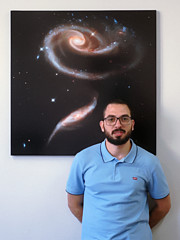|
Khaled Said completed his undergraduate studies at Cairo University (Egypt) before moving to the University of Cape Town (South Africa) for his Honours and Masters degrees as part of the National Astrophysics and Space Science Programme. He started his PhD at the Astronomy department in 2014, jointly supervised by Prof. Kraan-Korteweg and Prof. Jarrett at the University of Cape Town and Prof. Staveley-Smith at the University of Western Australia.
The main goal of his thesis is to provide a map of the large-scale structure of galaxies hidden behind the Milky Way, the so-called "Zone of Avoidance", and predict their flow fields using the Tully-Fisher relation. Two surveys have been launched that combine the H I 21-cm data, which is not affected by dust extinction, and near-infrared data, which suffers less from dust than optical to arrive at two distinct survey samples for ZOA galaxies. He submitted his thesis in March 2017 and will graduate from the University of Cape Town in July 2017.
He will take the TGF Fellowship to the Australian National University, where he will work with Prof. Matthew Colless on the Taipan Galaxy Survey. The Taipan survey will start in mid-2017 and will measure redshifts for one million galaxies and Fundamental Plane distances for approximately 100,000 galaxies over the following three-and-half years. This will significantly improve our understanding of the standard cosmological model by giving the most precise answers (to date) to three fundamental questions: (i) What is the expansion rate of the Universe? (ii) What are the density and velocity fields in the local Universe? and (iii) What is the correct theory of gravity?
|


















